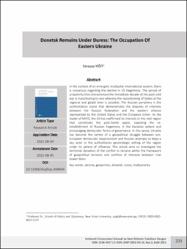| dc.contributor.author | Yiğit, Süreyya | |
| dc.date.accessioned | 2021-12-12T22:01:14Z | |
| dc.date.available | 2021-12-12T22:01:14Z | |
| dc.date.issued | 2021 | |
| dc.identifier.issn | 2146-3417 | |
| dc.identifier.issn | 2587-2052 | |
| dc.identifier.uri | https://doi.org/10.53306/klujfeas.948044 | |
| dc.identifier.uri | https://dergipark.org.tr/tr/pub/klujfeas/issue/65187/948044 | |
| dc.identifier.uri | https://hdl.handle.net/20.500.11857/4057 | |
| dc.description | DergiPark: 948044 | en_US |
| dc.description | klujfeas | en_US |
| dc.description.abstract | Ortaya çıkmaya başlayan çok kutuplu uluslararası bir sistem bağlamında ABD hegemonyasındaki düşüşle ilgili bir fikir birliğinin olduğu müşahede edilmektedir. Soğuk savaş sonrasının ilk on yılını karakterize eden tek kutupluluk dönemi, devletlerin bölgesel ve küresel düzeyde yeniden konumlandırılmasının mümkün olduğu bir döneme geçiyor. Rusya çevresi, Rusya Federasyonu ile Amerika Birleşik Devletleri ve Avrupa Birliği tarafından temsil edilen Batı ittifakı arasındaki çıkar çatışmalarını gösteren bir çatışma sahnesi haline gelmiştir. Bu anlamda Ukrayna, Avrupa yanlısı demokratik yayılmacılık ile Rusya'nın bölgenin jeostratejik otoriter düzeninde kilit bir aktör olarak tutmaya yönelik girişimleri arasındaki jeopolitik mücadelenin merkezi haline geldi. NATO lideri olarak ABD, Sovyet sonrası alanı oluşturan bu hayati bölgedeki çıkarlarını yeniden teyit etti, Avrasya alanında Rus hegemonyasının yeniden kurulmasına karşı çıktı ve demokratik yönetim biçimlerini teşvik etti. Bu makalenin amacı, rakip güç blokları arasındaki jeopolitik gerilimler ve çıkar çatışmaları çerçevesinde Ukrayna'daki çatışmanın bölgesel dinamiklerini incelemektir. | en_US |
| dc.description.abstract | In the context of an emergent multipolar international system, there is consensus regarding the decline in US hegemony. The period of unipolarity that characterized the immediate decade of the post-cold war is transitioning to one whereby the repositioning of States at the regional and global level is possible. The Russian periphery is the confrontation scene that demonstrates the disputes of interests between the Russian Federation and the western alliance represented by the United States and the European Union. As the leader of NATO, the US has reaffirmed its interests in this vital region that constitutes the post-Soviet space, opposing the re-establishment of Russian hegemony in the Eurasian sphere and encouraging democratic forms of governance. In this sense, Ukraine has become the centre of a geopolitical struggle between pro-European democratic expansionism and Russian attempts to keep a key actor in the authoritarian geostrategic setting of the region under its sphere of influence. This article aims to investigate the territorial dynamics of the conflict in Ukraine within the framework of geopolitical tensions and conflicts of interests between rival power blocs. | en_US |
| dc.language.iso | eng | en_US |
| dc.publisher | Kırklareli Üniversitesi | en_US |
| dc.relation.ispartof | Kırklareli Üniversitesi İktisadi ve İdari Bilimler Fakültesi Dergisi | en_US |
| dc.identifier.doi | 10.53306/klujfeas.948044 | |
| dc.rights | info:eu-repo/semantics/openAccess | en_US |
| dc.subject | Donetsk | en_US |
| dc.subject | Ukrayna | en_US |
| dc.subject | jeopolitik | en_US |
| dc.subject | Rusya | en_US |
| dc.subject | çokkutupluluk | en_US |
| dc.subject | Ukraine | en_US |
| dc.subject | Geopolitics | en_US |
| dc.subject | Donetsk | en_US |
| dc.subject | Russia | en_US |
| dc.subject | Multipolarity | en_US |
| dc.title | Donetsk Hala Baskı Altında: Doğu Ukrayna’nın İşgali | en_US |
| dc.title.alternative | Donetsk Remains Under Duress: The Occupation Of Eastern Ukraine | en_US |
| dc.type | article | |
| dc.department | [KLÜ Yayınları] | |
| dc.identifier.volume | 10 | en_US |
| dc.identifier.startpage | 203 | en_US |
| dc.identifier.issue | 2 | en_US |
| dc.identifier.endpage | 217 | en_US |
| dc.relation.publicationcategory | Makale - Ulusal Hakemli Dergi - Başka Kurum Yazarı | en_US |



















